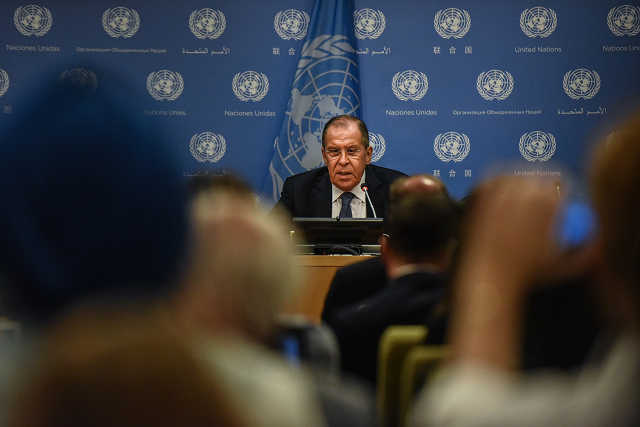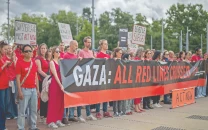Russia vows no safe passage for Syria militants in Idlib
Under a deal with Turkey that averted a large-scale military assault on the militant-held province

Russian Foreign Minister Sergey Lavrov holds a press briefing at the United Nations during the United Nations General Assembly on September 28, 2018 in New York City. PHOTO: AFP
Under the deal, Turkey agreed to separate opposition fighters from hardline militants who belong to groups branded as terrorists by the United Nations, but the fate of those extremists remains uncertain.
"There is talk that they will be sent off to other hotspots, for example Afghanistan," Russian Foreign Minister Sergei Lavrov told a news conference at UN headquarters. "This is unacceptable."
Syrian opposition think militants will quit Idlib buffer zone
"They have to be eliminated or there has to be a judicial process," he said.
Russia and Turkey reached the agreement after the United Nations and Western powers warned that an all-out assault on Idlib would lead to a humanitarian catastrophe in the province of three million people.
The deal calls for the creation of a buffer zone to be established by October 15 from which all fighters must withdraw to allow joint Russian-Turkish patrols.
Lavrov met with his counterparts from Iran and Turkey this week on the sidelines of the UN General Assembly to discuss next steps in the agreement on Idlib.
Iran and Russia provide vital military support for Syrian forces while Turkey supports armed groups. The three countries last year set up the Astana group, which has largely eclipsed UN efforts in Syria.
Lavrov said Turkey faced "not a simple task" in Idlib, noting that the United States had also promised to persuade moderate fighters to split from the militant groups but failed to deliver.
UN diplomats say the agreement between Russia and Turkey to avert an offensive on Idlib has created an opportunity to jumpstart political talks.
Syria says new air defences will make Israel think twice
On Thursday, seven countries including the United States, France, Saudi Arabia, Jordan and Egypt urged UN envoy Staffan de Mistura to urgently set up a committee on drafting a post-war constitution for Syria.
But Lavrov said preparations for the committee should not be rushed.
"We know that pressure is being applied to Staffan de Mistura," said Lavrov, adding that "it would be a grave mistake" to force the warring sides to begin work without an agreement.
More than 360,000 people have died in the war in Syria, now in its eighth year, and millions have been uprooted.



















COMMENTS
Comments are moderated and generally will be posted if they are on-topic and not abusive.
For more information, please see our Comments FAQ